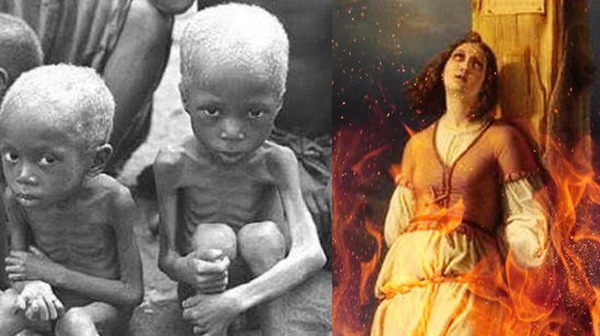As said by James Hutton, ‘The present is the key to the past,’ meaning that understanding yesterday’s events may be impossible until we view them from today’s perspective.
On May 30, 1967, the Republic of Biafra was declared due to ethnic violence which arose after the July 29, 1966 countercoup enforcing General Yakubu Gowon, as Nigeria’s head of state. However, it was unrecognized and rejected by Nigeria, although some nations including Gabon, Haiti, Ivory Coast, Tanzania, and Zambia recognized it.
Six years after Nigeria gained independence, the Muslim Hausas in Northern Nigeria began massacring the Christian Igbos, causing tens of thousands of Igbos to flee to the east, where they were the dominant ethnic group. The Igbos, doubting the Nigerian military government’s intentions, declared the Republic of Biafra on May 30, 1967, led by Lieutenant Colonel Odumegwu Ojukwu.
Diplomatic efforts to reunite Nigeria failed, and war broke out in July 1967. Despite initial successes, Biafra’s territory shrank under Nigeria’s superior military. On January 11, 1970, Nigerian forces captured Owerri, forcing Ojukwu to flee to the Ivory Coast. Biafra surrendered on January 15, 1970.
The Nigerian Civil War lasted for three years, leading to the loss of oil fields, Biafra’s main revenue source. The war led to a humanitarian crisis with an estimated one million being killed and countless civilians dying from starvation and disease. Biafra comprised 29,848 sq mi with a coast on the Gulf of Guinea.
While the war ended, it left underlying ethnic divisions that remain till now. However, acclaimed supporters of IPOB still remember the war and honor the victims on this day.
Other nations:
On May 30, 1431, in Rouen, Normandy, Joan of Arc was executed by burning at the stake for heresy. Born in 1412 in Domremy, she grew up during the Hundred Years’ War between England and France. Her village lay on the frontier between French and Anglo-Burgundian territories. At 16, Joan claimed to hear divine voices urging her to support the French Dauphin in reclaiming his throne. In 1429, after convincing local authorities of her mission, Joan met Charles, the Dauphin, and was eventually granted command of a small army.
She achieved a significant victory by lifting the siege of Orleans and led the French to several subsequent victories, culminating in Charles’ coronation as King Charles VII in Reims. Joan continued to fight but was captured by the Burgundians in May 1430.
Sold to the English, she was tried for heresy in 1431. Her rejection of church authority in favor of divine inspiration led to her conviction. After initially recanting, she reverted to her previous claims and was condemned as a relapsed heretic. She was executed at 19, holding a crucifix and hearing prayers as she died. Joan’s military leadership helped shift the war in France’s favor, leading to the eventual French victory. In 1920, she was canonized by the Roman Catholic Church, with her feast day celebrated on May 30.
On May 30, 1854: The Kansas-Nebraska Act was passed, allowing the people in the Kansas and Nebraska territories to decide whether slavery would be permitted in their territories. This act effectively repealed the Missouri Compromise and led to a violent conflict known as “Bleeding Kansas,” as pro-slavery and anti-slavery settlers rushed to populate Kansas and influence the vote.
On May 30, 1911: The first Indianapolis 500 automobile race was held, won by Ray Harroun. Driving a Marmon Wasp, Harroun completed the 500-mile race in approximately 6 hours and 42 minutes, averaging around 74.6 mph, and notably used a rearview mirror to avoid needing a riding mechanic.
On May 30, 1925: British police killed 12 labor demonstrators in Shanghai, China, leading to nationwide strikes and protests. The incident escalated anti-imperialist sentiments in China and contributed to the rise of nationalist and communist movements against foreign dominance and local warlords.
On May 30, 1942: The British Royal Air Force dispatched over 1,000 bombers against Cologne, Germany, during World War II. This operation, known as the first 1,000-bomber raid, was part of the Allies’ strategic bombing campaign and aimed to cripple German industrial production and morale.
On May 30, 1961: Rafael Trujillo, the dictator of the Dominican Republic, was assassinated. His brutal 31-year regime, marked by widespread human rights abuses, censorship, and corruption, ended abruptly, leading to political instability and a power struggle in the Caribbean nation.
On May 30, 1971: The US Mariner 9 spacecraft was launched, becoming the first satellite to orbit Mars. Mariner 9 sent back detailed images and data of the Martian surface, revealing features such as volcanoes, canyons, and evidence of ancient riverbeds, significantly advancing our understanding of the Red Planet.
On May 30, 1980: Charles Taylor, the former president of Liberia, was sentenced to 50 years in prison for crimes against humanity and war crimes committed during the Sierra Leone civil war. Taylor’s trial and conviction by the Special Court for Sierra Leone marked a significant moment in international justice, holding a former head of state accountable for atrocities.
On May 30, 2011: Germany announced its decision to abandon nuclear energy following the Fukushima nuclear disaster in Japan. The plan, known as the Energiewende, aimed to transition Germany to renewable energy sources, with a target to shut down all nuclear power plants by 2022, reflecting a strong shift in energy policy and public opinion.



